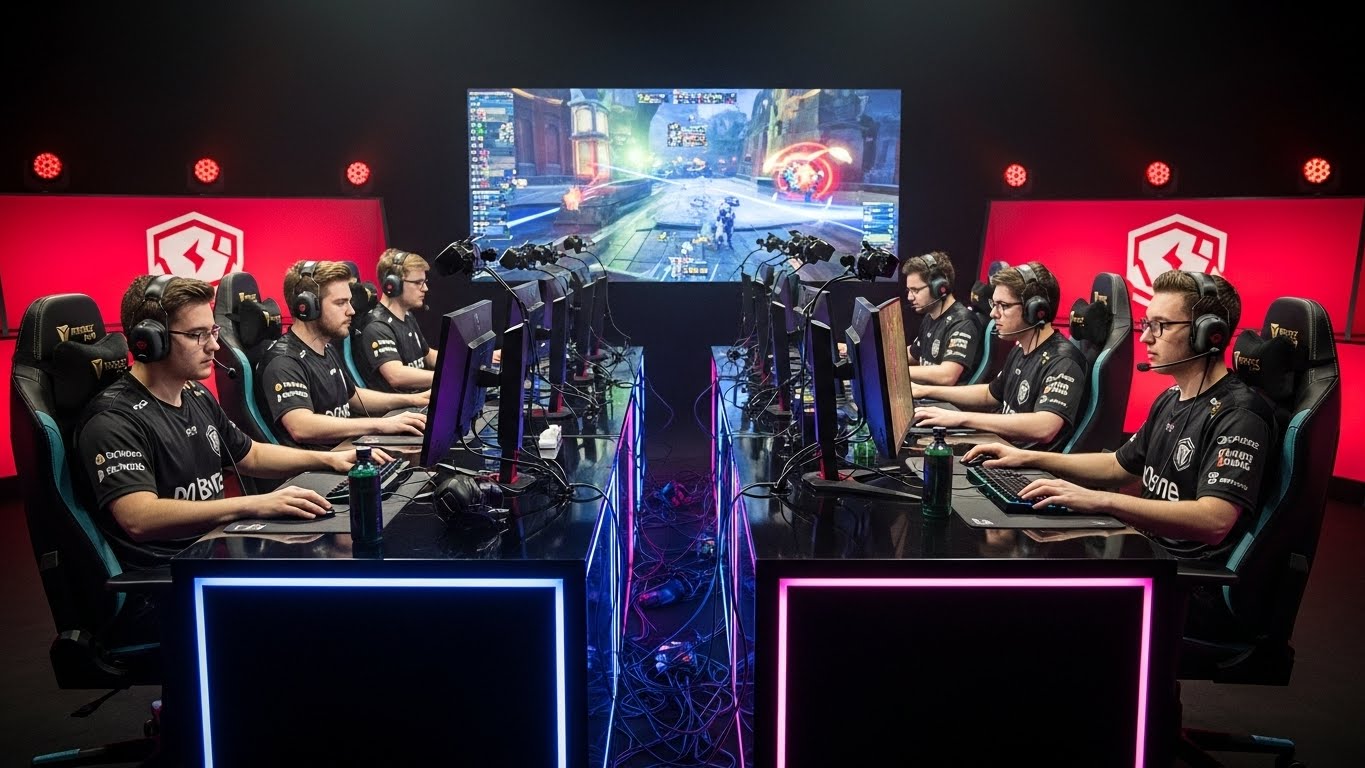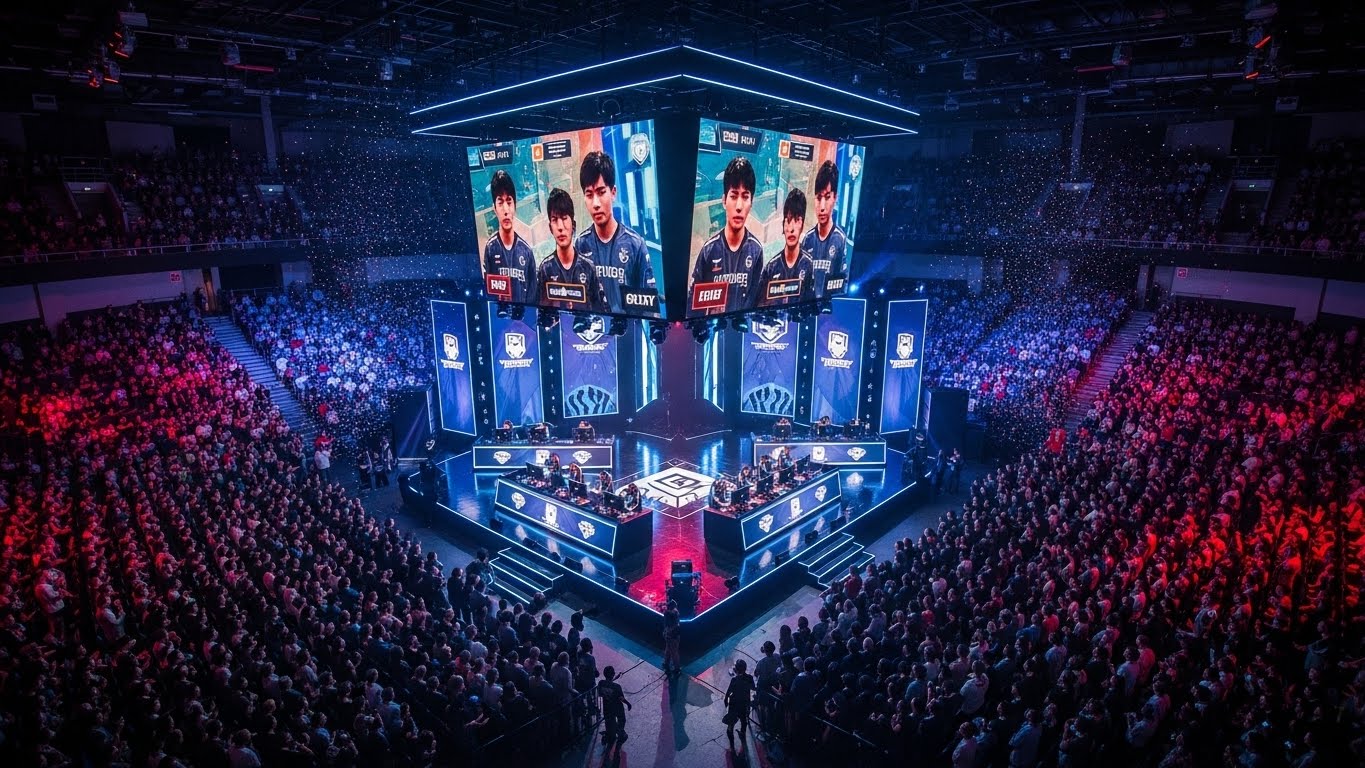Esports, once considered a niche hobby, has grown into a global entertainment powerhouse. What began as casual competitions among friends or small online communities has transformed into a professional, multi-billion-dollar industry with millions of viewers worldwide. Competitive gaming has transcended traditional entertainment, merging skill, strategy, storytelling, and technology into a uniquely immersive experience.
The evolution of esports mirrors the growth of digital culture. It reflects technological advancements, social trends, and the ways humans interact with games and one another. Esports is no longer just about playing games—it is a form of entertainment, a career, and a cultural phenomenon that unites people across continents and generations.
The Early Days of Competitive Gaming
The origins of esports trace back to the late 1970s and early 1980s, when arcade games like Space Invaders, Pac-Man, and Donkey Kong became popular. Competitions were often informal, taking place in arcades, school gyms, or local communities. Players would compete for high scores, prizes, or mere bragging rights. These early contests laid the foundation for organized competitive gaming.
With the introduction of home consoles and personal computers in the 1980s and 1990s, gaming became more accessible. Titles like Street Fighter, Mortal Kombat, StarCraft, and Counter-Strike fostered competitive communities, emphasizing skill, reflexes, and strategy. Local tournaments became more common, and gaming magazines and forums provided platforms for discussion, strategy sharing, and community building.
The widespread adoption of the internet in the 1990s further expanded competitive gaming. Online multiplayer games allowed players from across the world to connect and compete in real time. This era saw the first structured tournaments, which eventually evolved into the professional esports leagues we know today.
South Korea and the Birth of Professional Esports
South Korea played a pivotal role in shaping modern esports. In the late 1990s and early 2000s, StarCraft: Brood War became a cultural phenomenon, with televised competitions drawing massive audiences. Professional players were treated like athletes, complete with sponsorships, contracts, and fan followings.
The infrastructure for professional gaming in South Korea included dedicated training houses, coaching staff, and rigorous practice schedules. Players devoted hours each day to perfecting their skills, honing strategies, and coordinating with teammates. South Korea’s esports model became a blueprint for professional organizations worldwide, emphasizing discipline, skill, and entertainment value.
The success of South Korean esports demonstrated that gaming could be more than a hobby—it could be a legitimate career and a global spectacle. This paved the way for international tournaments, professional leagues, and the eventual mainstream acceptance of esports.
The Rise of Global Esports Titles
Several key games have shaped the evolution of esports, each introducing unique gameplay mechanics, competitive formats, and fan communities.
League of Legends, developed by Riot Games, has become one of the most popular esports titles globally. Its structured leagues, seasonal competitions, and world championships create an environment similar to traditional sports. Teams strategize meticulously, players specialize in roles, and matches are broadcasted to millions of viewers.
Dota 2, created by Valve, is renowned for its complexity and high-stakes tournaments. The International, Dota 2’s flagship tournament, features multi-million-dollar prize pools, attracting elite players and global media attention. The game’s strategic depth and dynamic gameplay have established it as a cornerstone of competitive gaming.
Counter-Strike: Global Offensive represents the competitive shooter genre. Its emphasis on precision, teamwork, and strategy has made it a mainstay in esports for years. Its tournaments, from small LAN events to massive global competitions, showcase player skill and tactical coordination.
Other games such as Overwatch, Fortnite, Call of Duty, and Valorant have diversified the esports landscape, appealing to new demographics and introducing innovative competition formats. Each title contributes to the richness of esports culture, providing unique experiences for both players and spectators.
The Spectacle of Esports Tournaments
Tournaments are the lifeblood of esports. They provide structure, showcase talent, and create entertainment for global audiences. From local competitions to international championships, tournaments turn competitive gaming into immersive experiences.
Modern esports events rival traditional sports spectacles. Venues are packed with cheering fans, live commentary adds drama, and stage production includes lighting, visual effects, and music. Streaming platforms broadcast these events globally, enabling millions of viewers to engage simultaneously.
Flagship tournaments like The International, League of Legends World Championship, and the Overwatch League Finals highlight the scale and impact of esports. Millions watch live streams, analyze strategies, and participate in fan communities. The competitive narrative, coupled with personal stories of players and teams, adds drama and emotional investment for audiences.
Streaming and Content Creation in Esports
Streaming has revolutionized how esports is consumed. Platforms like Twitch and YouTube Gaming allow players to broadcast gameplay live, interact with viewers, and build personal brands. This interactivity creates a unique entertainment experience, transforming viewers from passive spectators to active participants.
Content creation extends beyond live matches. Highlight reels, analysis videos, tutorials, and commentary enrich the audience experience, offering insight into strategies and player performance. Esports content creators have become influential figures, shaping gaming culture, inspiring new players, and driving fan engagement.
Social media further amplifies esports content. Fans discuss matches, share memes, and celebrate victories online. The interconnected nature of streaming, content creation, and social media engagement has transformed esports into a cultural phenomenon, transcending traditional notions of sports and entertainment.
The Professional Life of an Esports Player
Professional esports players face demands comparable to traditional athletes. Training schedules are rigorous, often exceeding eight to ten hours daily. Players focus on mechanical skills, strategic understanding, teamwork, and mental resilience.
Esports organizations provide comprehensive support, including coaching, nutrition, physical training, and psychological guidance. The professionalization of esports ensures that players can perform at peak levels while maintaining physical and mental well-being.
Players also cultivate personal brands, leveraging social media, streaming, and sponsorship deals. They become public figures, influencing culture, fashion, and entertainment beyond the gaming arena. The dedication required highlights esports as a legitimate and demanding career path.
Economics of Esports
Esports has evolved into a multi-billion-dollar industry. Revenue streams include tournament prize money, sponsorships, merchandise, advertising, and streaming subscriptions. Major organizations, teams, and events generate significant economic activity, supporting thousands of jobs globally.
Corporate sponsorships are essential, funding tournaments and supporting players. Brands ranging from technology to apparel and energy drinks invest heavily in esports to reach younger, digitally engaged audiences. Prize pools for flagship events often reach millions, underscoring the financial viability of competitive gaming.
The economic growth of esports demonstrates its cultural relevance and mainstream appeal. Investment continues to expand, enabling further professionalization, technological innovation, and global engagement.
The Role of Technology in Esports
Technology underpins every aspect of esports. High-speed internet, advanced gaming hardware, analytics tools, and streaming software allow professional-level competition and global audience engagement. Technological innovation has fueled the rapid expansion and professionalization of esports.
Virtual reality and augmented reality promise new forms of immersive competition. Artificial intelligence supports strategy analysis, performance optimization, and audience engagement. Even production technology has transformed esports into a spectator-friendly entertainment spectacle, complete with live statistics, replays, and interactive content.
The integration of technology ensures esports remains dynamic, scalable, and globally accessible. It allows for innovation in gameplay, broadcasting, and fan interaction, solidifying esports as a leading form of digital entertainment.
Community and Culture
Esports thrives on community. Fans, players, content creators, and organizations form interconnected networks that shape culture, celebrate achievements, and foster engagement. Online forums, social media, and fan events create spaces for discussion, collaboration, and celebration.
Esports culture emphasizes creativity, skill, and collaboration. Memes, fan art, cosplay, and analysis videos contribute to the vibrancy of the community. Shared experiences—whether celebrating a tournament victory or discussing a strategic play—create bonds that extend beyond the game itself.
Community involvement also promotes inclusivity. Efforts to encourage participation from underrepresented groups are increasing, broadening the reach of esports and ensuring diverse perspectives and voices contribute to its culture.
Education and Esports
Education and esports have become increasingly intertwined. Schools and universities are recognizing esports as a means to develop teamwork, strategy, communication, and digital literacy skills. Many institutions offer esports programs, scholarships, and competitive teams, providing students with both educational and professional opportunities.
Esports programs teach not only gameplay skills but also leadership, management, marketing, and production. Students gain hands-on experience in organizing tournaments, creating content, and managing teams, preparing them for careers within and beyond esports. The educational integration of esports demonstrates its legitimacy and long-term cultural impact.
The Future of Esports
The future of esports is bright and filled with potential. Emerging technologies like virtual reality, augmented reality, and artificial intelligence will create more immersive experiences for players and spectators. Interactive competitions, holographic broadcasts, and global connectivity will further enhance audience engagement.
Esports will continue to integrate with traditional entertainment, including film, music, and sports. Media partnerships, celebrity collaborations, and cross-platform events will expand its influence and reach. The professionalization of esports will deepen, offering structured career paths, coaching opportunities, and sustainable growth.
Inclusivity and diversity will shape the next era of esports. Efforts to encourage participation from women, underrepresented communities, and global regions will strengthen both the community and the competitive ecosystem.
The essence of esports will remain unchanged: competition, skill, entertainment, and community. As technology and culture evolve, esports will continue to define the future of digital sports and entertainment.
Conclusion
Esports has grown from humble beginnings into a global entertainment phenomenon. It combines skill, strategy, storytelling, and technology into a unique cultural and competitive experience. From early arcade competitions to massive international tournaments, esports has evolved into a professional industry with millions of fans, dedicated players, and a vibrant community.
The impact of esports extends beyond gaming. It shapes culture, influences media, and creates professional opportunities. It demonstrates the transformative power of technology in connecting people, fostering creativity, and redefining entertainment.
As esports continues to expand, it will maintain its unique identity: a digital, interactive, and globally celebrated form of competition. Esports is not just a game—it is a career, a lifestyle, and a cultural movement that continues to inspire, unite, and entertain millions worldwide.



